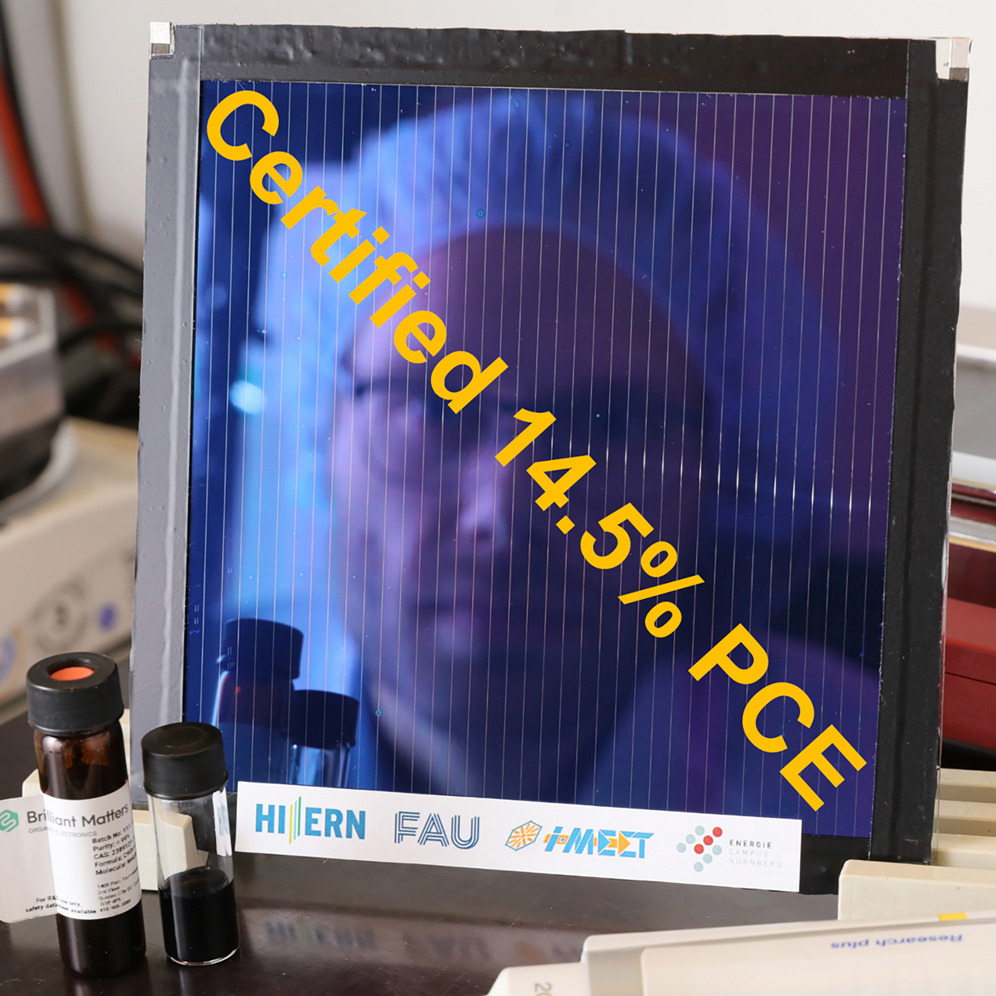An international research team led by Germany's Friedrich-Alexander-Universität Erlangen-Nürnberg has built a large area organic photovoltaic (OPV) panel with a world record efficiency of 14.5%.
The result was certified by the Fraunhofer Institute for Solar Energy Systems (Fraunhofer ISE). For the same module type, the Friedrich-Alexander-Universität Erlangen-Nürnberg achieved an efficiency of 14.46% in December 2023. That result was a jump up from the previous record of 13.1 % recorded for a 57-cell encapsulated module by Taiwan-based OPV specialist, Ways Technical Corporation (Waystech) and Nanobit.
The module relies on 216 individual 4 mm² solar cells. The devices were built with a substrate based on glass and indium tin oxide (ITO), an electron transport layer (ETL) based on zinc oxide (ZnO), an absorber made of an organic material known as PM6:Y6-C12:PC61BM, a hole transport layer (HTL) relying on the polymer PEDOT-F, and a silver (Ag) metal contact.
The group used P1, P2, and P3 laser scribing for building the monolithic interconnections that add voltages between cells in modules. It constructed a module with a size of 143 mm × 143 mm and an active area of 204.11 cm².
The scientists said that, in the cell-to-module scaling up process, there were lower resistive losses thanks to an accelerated blade coating technique that reportedly enabled homogeneous coatings with a thickness deviation of less than 5%. The ETL, the absorber, and the HTL were all blade-coated from non-halogenated solvents in ambient air.
Popular content
Tested under standard illumination conditions, the module achieved a maximum power conversion efficiency of 15.1% and a fill factor of 76.0%, which the scientists said is the same as that of the individual solar cells used in the panel.
These results should appear soon in the US Department of Energy’s National Renewable Energy Laboratory (NREL) champion PV module efficiency chart. “This work presents cutting-edge upscaling research on OPVs that aims at closing the efficiency gap between high-performance cells and modules,” the researchers said.
The new OPV module was presented in the paper “Large-area organic photovoltaic modules with 14.5% certified world record efficiency,” published in Joule. The research team comprised academics from Germany's Nuremberg Institute of Technology, Canada-based OPV material supplier Brilliant Matters, and China's Huazhong University of Science and Technology.
This content is protected by copyright and may not be reused. If you want to cooperate with us and would like to reuse some of our content, please contact: editors@pv-magazine.com.



1 comment
By submitting this form you agree to pv magazine using your data for the purposes of publishing your comment.
Your personal data will only be disclosed or otherwise transmitted to third parties for the purposes of spam filtering or if this is necessary for technical maintenance of the website. Any other transfer to third parties will not take place unless this is justified on the basis of applicable data protection regulations or if pv magazine is legally obliged to do so.
You may revoke this consent at any time with effect for the future, in which case your personal data will be deleted immediately. Otherwise, your data will be deleted if pv magazine has processed your request or the purpose of data storage is fulfilled.
Further information on data privacy can be found in our Data Protection Policy.